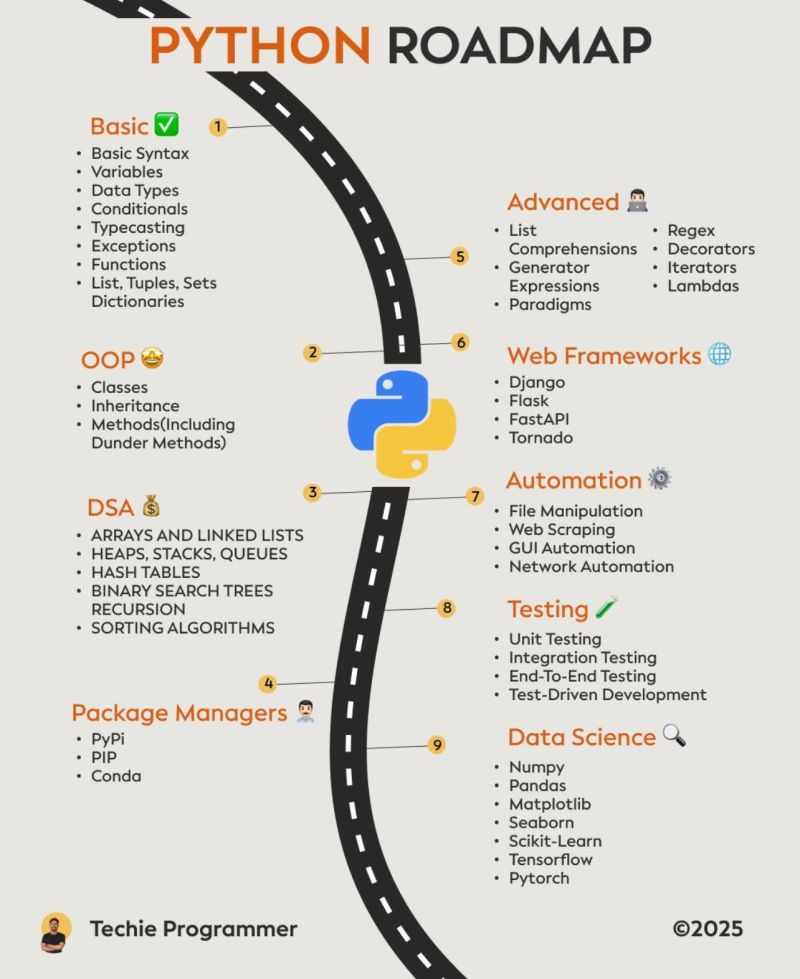Python is the most beginner-friendly yet industry-relevant programming language that continues to dominate across fields such as data science, automation, and web development. This comprehensive Python roadmap for 2025 is your step-by-step guide to mastering Python from scratch, building job-ready skills, and becoming a pro developer.
🚀 Why Python in 2025?
In 2025, Python remains the most in-demand programming language, powering everything from AI to backend development. Its readability, extensive libraries, and vast community make it the top choice for students, developers, and startups alike.

📍 Step 1: Master Python Basics
Start with the foundations that every developer must know.
🔹 Key Topics to Cover
- Basic Syntax
- Variables and Data Types
- Conditionals (if-else, elif)
- Loops (for, while)
- Typecasting
- Functions
- Lists, Tuples, Sets, Dictionaries
- Exception Handling
🔗 Free Resource: W3Schools Python Basics
📍 Step 2: Dive into Object-Oriented Programming (OOP)
Understanding OOP is crucial for writing scalable, maintainable code.
🔹 Learn These Concepts
- Classes & Objects
- Constructors & Dunder Methods
- Inheritance & Polymorphism
- Encapsulation & Abstraction
🔗 Resource: OOP Explained on LinkedIn Learning
📍 Step 3: Data Structures and Algorithms (DSA)
Sharpen your problem-solving skills by practicing DSA in Python.
🔹 Must-Know Data Structures
- Arrays & Linked Lists
- Stacks, Queues, Heaps
- Hash Tables
- Binary Search Trees
🔹 Algorithms to Practice
- Sorting (Bubble, Merge, Quick Sort)
- Recursion Techniques
- Searching (Binary, Linear)
🔗 Resource: DSA with Python Guide
📍 Step 4: Package Management with Pip, PyPi & Conda
Learn how to install, manage, and organize Python libraries.
🔹 Master These Tools
pip installfor Python packages- Exploring PyPi
- Creating isolated virtual environments
- Using Conda for data science workflows
🔗 Resource: Virtual Environments & Pip
📍 Step 5: File Handling & Exception Management
Understand how to work with files and handle unexpected errors.
🔹 Learn to
- Open, read, write, and delete files using
open() - Handle exceptions using
try,except,finally - Use context managers (
with open...) for cleaner code
🔗 Resource: Python File Handling
📍 Step 6: Master the Standard Python Libraries
Python offers built-in libraries to save time and boost productivity.
🔹 Explore These Core Libraries
math– Math operationsrandom– Generate random valuesdatetime– Work with dates/timesos– File system interactionre– Regular Expressions
🔗 Official Docs: Python Standard Library
📍 Step 7: Intermediate Python Concepts
Push your skills beyond the basics.
🔹 Learn These Powerful Concepts
- List Comprehensions
- Lambda Functions
- Generators
- Decorators
- Iterators
- Map, Filter, Reduce
- Regular Expressions (Regex)
🔗 Resource: Intermediate Python
📍 Step 8: Choose Your Specialization Track
Based on your career goals, specialize in one of the following paths:
🔸 🧠 Data Science
- Libraries: NumPy, Pandas, Matplotlib, Seaborn, Scikit-learn, TensorFlow, PyTorch
- Skills: Data wrangling, visualization, machine learning
🔸 🤖 Automation
- Tools: Selenium, BeautifulSoup, openpyxl, PyAutoGUI
- Skills: Web scraping, GUI automation, file management
🔸 🌐 Web Development
- Frameworks: Flask, Django, FastAPI
- Skills: Routing, templating, backend APIs, authentication
🔗 Resource: Python Tracks Guide
📍 Step 9: Testing Your Code
Writing bug-free, reliable software means you need to test thoroughly.
🔹 Understand These Testing Types
- Unit Testing – Test individual components
- Integration Testing – Check component collaboration
- End-to-End Testing – Simulate real user scenarios
- Test-Driven Development (TDD) – Write tests before coding
📍 Step 10: Build Real Projects & Use GitHub
Nothing teaches faster than hands-on experience. Projects demonstrate skills to employers and help you solidify knowledge.
🔹 Starter Project Ideas
- To-Do App with Flask
- Budget Tracker using Pandas
- Weather App using APIs
- File Renamer Tool using OS module
- Web Scraper for Job Listings
🔹 Share on GitHub
- Create a GitHub profile
- Write README files
- Use version control (Git)
- Build a portfolio of completed projects
🔗 Resource: GitHub for Beginners
🔥 Bonus: Free Resources to Learn Python in 2025
- w3schools.com/python – Beginner friendly
- RealPython.com – Intermediate to advanced
- freeCodeCamp – Full tutorials with videos
- Kaggle – Data Science & ML notebooks
- LeetCode & HackerRank – Practice problems & DSA
- PyBites – Daily Python exercises
🏁 Final Thoughts: Your Python Mastery Path
To truly master Python:
- Start with basics, nail the syntax.
- Learn core logic with OOP & DSA.
- Apply knowledge through projects.
- Choose a domain, specialize deeply.
- Contribute to open-source or freelance.
- Keep practicing, keep exploring.

